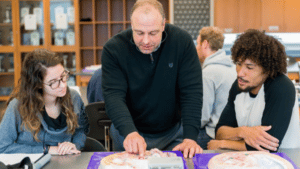Jordan Kadas’s experience in her introductory chemistry course at Cuyahoga Community College wasn’t that different from many of her peers in community colleges across the country. “I was mixed in with people who hadn’t gone to school for 10 years, while others had basic chemistry knowledge and there were some high school students in my class,” says Kadas. “There were really different knowledge levels, and it made each of our [course] experiences very different.”
Those varied experiences are also what prompted chemistry professor Dr. Anne Distler to begin experimenting with different technologies to improve her online courses. “There’s a lot of math and science phobia,” says Distler, a faculty member at the Ohio college, known locally as Tri-C. “There’s a lot of concern as students start launching into a class they’re not comfortable with. I realized there needed to be a better way to reach students engaging on online platforms.”
Gateway science courses for both STEM majors and those completing general degree requirements require students to master complex concepts. Always challenging, these courses have been made more difficult for many students by the transition to online learning during the pandemic. Colleges participating in the Every Learner Everywhere Network found that adaptive courseware engaged students and supported their learning.
Their experience, captured in the case study suggests that adaptive courseware has multiple benefits, including supporting students who need help with prerequisite concepts, guiding students through complex, multistep processes, helping faculty identify where students are struggling, and reducing the cost of course materials.
A Learning Experiment: Developing Critical Thinking Skills with Adaptive Courseware in Gateway Science Courses
This case study examines the efforts at three of the seven ATD Network colleges participating in the Every Learner Everywhere initiative who implemented adaptive courseware to help more students persist and succeed in gateway science courses. The study suggests that adaptive courseware helped students who need support with prerequisite concepts, provided tools to help guide students through complex, multistep processes, gave faculty insights into concepts students were struggling with, and reduced the cost of course materials.
Download the case study
The study is part of a series of 12 case studies examining the use of adaptive courseware in gateway courses that Achieving the Dream (ATD) is producing as a partner in the Every Learner network. Three of the seven ATD network colleges in Florida, Ohio, and Texas that took part in this pilot work as part of the Every Learner initiative focused in on gateway science courses and are highlighted in this case study.
Key takeaways
- The approach to guided review and assignments in adaptive courseware aligns with the discipline’s approach to conceptual and applied learning.
- Participating faculty reported that adaptive courseware increased engagement and, at times, academic success, among students who actively used it.
- Faculty and students both stressed the importance of acclimating students to adaptive work, monitoring progress and intervening when individual students struggle, and ensuring that adaptive assignments align with course content and objectives.
- Students reported that courseware could be more challenging and time-consuming than traditional assignments in science courses but acknowledged that adaptive activities helped them learn complex concepts.
